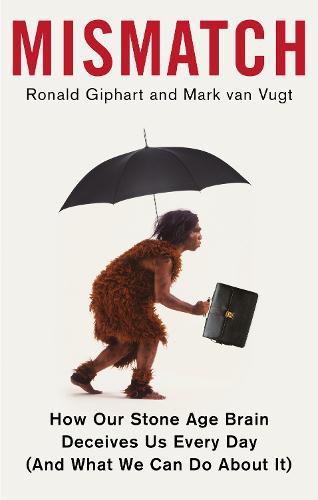Readings Newsletter
Become a Readings Member to make your shopping experience even easier.
Sign in or sign up for free!
You’re not far away from qualifying for FREE standard shipping within Australia
You’ve qualified for FREE standard shipping within Australia
The cart is loading…






Our brains evolved to solve the survival problems of our Stone Age ancestors, so when faced with modern day situations that are less extreme, they often encounter a mismatch. Our primitive brains put us on the wrong foot by responding to stimuli that - in prehistoric times - would have prompted behaviour that was beneficial. If you’ve ever felt an anxious fight or flight response to a presenting at a board meeting, equivalent to facing imminent death by sabre-toothed tiger, then you have experienced a mismatch.
Mismatch is about the clash between our biology and our culture. It is about the dramatic contrast between the first few million years of human history - when humans lived as hunters and gatherers in small-scale societies - and the past twelve thousand years following the agricultural revolution which have led us to comfortable lives in a very different social structure. Has this rapid transition been good for us? How do we, using our primitive minds, try to survive in a modern information society that radically changes every ten years or so?
Ronald Giphart and Mark van Vugt show that humans have changed their environment so drastically that the chances for mismatch have significantly increased, and these conflicts can have profound consequences.
Reviewed through mismatch glasses, social, societal, and technological trends can be better understood, ranging from the popularity of Facebook and internet porn, to the desire for cosmetic surgery, to our attitudes towards refugees.
Mismatches can also affect our physical and psychological well-being, in terms of our attitudes to happiness, physical exercise, choosing good leaders, or finding ways to feel better at home or work.
Finally, Mismatch gives us an insight into politics and policy which could enable governments, institutions and businesses to create an environment better suited to human nature, its potential and its constraints.
This book is about converting mismatches into matches. The better your life is matched to how your mind operates, the greater your chances of leading a happy, healthy and productive life.
$9.00 standard shipping within Australia
FREE standard shipping within Australia for orders over $100.00
Express & International shipping calculated at checkout
Our brains evolved to solve the survival problems of our Stone Age ancestors, so when faced with modern day situations that are less extreme, they often encounter a mismatch. Our primitive brains put us on the wrong foot by responding to stimuli that - in prehistoric times - would have prompted behaviour that was beneficial. If you’ve ever felt an anxious fight or flight response to a presenting at a board meeting, equivalent to facing imminent death by sabre-toothed tiger, then you have experienced a mismatch.
Mismatch is about the clash between our biology and our culture. It is about the dramatic contrast between the first few million years of human history - when humans lived as hunters and gatherers in small-scale societies - and the past twelve thousand years following the agricultural revolution which have led us to comfortable lives in a very different social structure. Has this rapid transition been good for us? How do we, using our primitive minds, try to survive in a modern information society that radically changes every ten years or so?
Ronald Giphart and Mark van Vugt show that humans have changed their environment so drastically that the chances for mismatch have significantly increased, and these conflicts can have profound consequences.
Reviewed through mismatch glasses, social, societal, and technological trends can be better understood, ranging from the popularity of Facebook and internet porn, to the desire for cosmetic surgery, to our attitudes towards refugees.
Mismatches can also affect our physical and psychological well-being, in terms of our attitudes to happiness, physical exercise, choosing good leaders, or finding ways to feel better at home or work.
Finally, Mismatch gives us an insight into politics and policy which could enable governments, institutions and businesses to create an environment better suited to human nature, its potential and its constraints.
This book is about converting mismatches into matches. The better your life is matched to how your mind operates, the greater your chances of leading a happy, healthy and productive life.